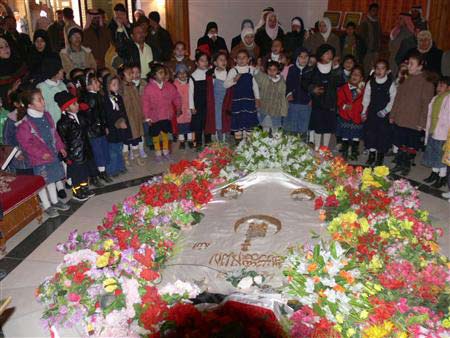Opinion Editorials, November 2007
|
|
|
Saddam
Hussein remembered at hometown one year after execution
By Ali Salih, Ahmad Jamal www.chinaview.cn
BAGHDAD, Dec. 30, 2007 (Xinhua) -- A year after former Iraqi president Saddam Hussain was executed, his influence is still strongly palpable at his hometown as the country remain polarized in sectarian hatred. Abdullah Jbara, governor of Salahudin province in northern Iraq, told Xinhua that the role Saddam had played should be viewed in an impartial manner just like any other political figures in the history. "The man had good acts as well as bad ones. So we need to look at his good deeds and make use of them, and at the same time we need to fix the wrongdoing he had committed," said Jabara, who gained reputation and respect in the province for insisting that Saddam should be buried at his birth place instead of a secret location. The governor, however, wondered why Saddam was hanged one year ago. "Was it the law or the sectarian and political motives?" The building, in which Saddam is buried, was constructed during his regime at his birthplace -- Awja village. Its hall is usually used for condolence gatherings. Its walls are decorated with pictures representing different periods of Saddam's life, as well as with wreaths of roses presented by his supporters. Dozens of families visited his tomb on Dec. 19, the first day of Sunni Muslims' key festival of Eid al-Adha holidays. Sheik Abdul Hameed al-Dowri, a leading tribe man in Saddam's hometown Tikrit, said the city where Saddam spent his poor childhood before he joined the Baath Party still considers the manas "the best-ever Iraqi leader." "We continue saying that Saddam was wise and far away from sectarianism. His words and slogans are still decorating the walls of the city without being removed by the local government," he said. A main hospital, a major street and a grand mosque in Tikrit remain named after Saddam, while all the reminders of him were removed in other parts of Iraq immediately after his statue in the Firdous Square in central Baghdad was towed down on April 9, 2003. The toppled president was sentenced to death on Nov. 5, 2006 by the (US-installed) Iraqi High Criminal Court for his role in the killing of 143 Iraqi Shi'is in Dujail village in 1982 in retaliation for an attempt on him. Saddam, at the age of 69, was executed at approximately 6 a.m. (0300 GMT) on Dec. 30 of 2006, several minutes before Sunni Iraqis began to celebrate Eid al-Adha, during which they slaughter sheep in memory of Prophet Abraham. "The man (Saddam) was dragged away like he was a sheep waiting for slaughter. This was humiliated for people whether they supported him or not," Dowri said. An leaked mobile phone video footage, which showed that Saddam was taunted right before his execution, further stirred up anger among Sunnis Iraqis and deepened the sectarian rift. "The execution of Saddam was very painful, and those who executed him were only sick people with the disease called revenge," said Ahmad Nofan, a journalist in the province. "The only thing we have gained after the occupation is killings by militia. This is what the Americans flaunts as democracy. Is this what Iraq stands for now? Executions? I'm sure the world will be impressed," he said, referring to the chaos and bloodshed in the wake of the 2003 U.S.-led invasion. The U.S. military said violence in Iraq dropped by 60 percent over the past six months. It attributes the pickup of security partly to the cooperation of a growing number of Sunnis who are turning their guns at al-Qaida. However, discord and mistrust are still in the way of the reconciliation process. The Sunni parties have not yet returned to the government, while the passage of a series of key laws is hardly expected to come soon. Ali al-Nida, head of Saddam's Albu-Nassir clan, said people in Iraq have to forget about the past and take the lessons so that they can enhance the national unity and build their own country to compensate the people for their pains whether before and after the collapse of Saddam's regime. He said he wants to call on all the Iraqis to "reconcile and forget the past and offer the good to our offspring instead of leaving them fighting each other." "We have to build a future without revenge," Nida said. |
|
|
|
|
||
|
||||||



